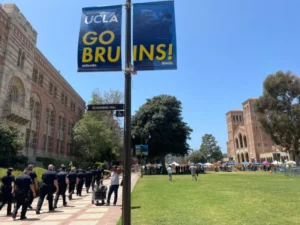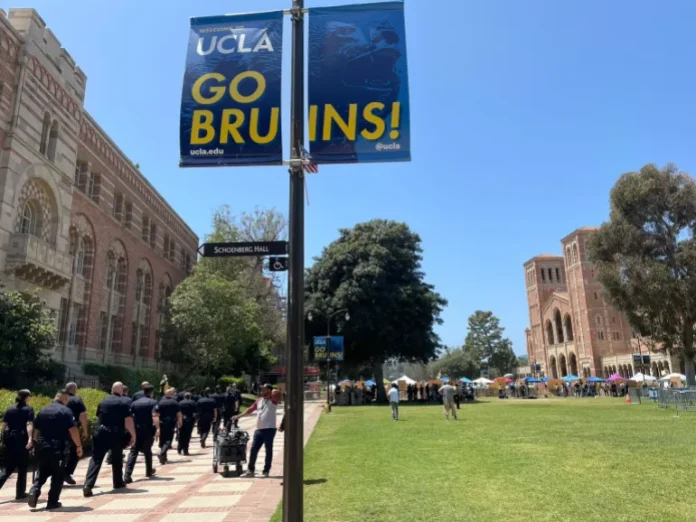The clashes at the California college encampment underscore the urgent need for de-escalation and dialogue in the face of complex geopolitical conflicts. By upholding values of respect, empathy, and peaceful engagement, individuals can contribute to a more inclusive and harmonious society, where diverse perspectives are heard and conflicts are resolved through nonviolent means.
 The peaceful atmosphere at the pro-Palestine encampment at UCLA’s entrance starkly contrasts with the persistent buzzing of a police helicopter circling overhead. This juxtaposition serves as a poignant reminder of the underlying tensions and complexities surrounding the issue of Palestinian rights and activism on university campuses. The orderly and quiet proceedings underscore the dedication and resilience of the activists engaged in the cause, who persist in advocating for justice and solidarity despite the presence of external surveillance and potential threats.
The peaceful atmosphere at the pro-Palestine encampment at UCLA’s entrance starkly contrasts with the persistent buzzing of a police helicopter circling overhead. This juxtaposition serves as a poignant reminder of the underlying tensions and complexities surrounding the issue of Palestinian rights and activism on university campuses. The orderly and quiet proceedings underscore the dedication and resilience of the activists engaged in the cause, who persist in advocating for justice and solidarity despite the presence of external surveillance and potential threats.
The hovering police helicopter symbolizes the institutional forces at play, monitoring and surveilling dissenting voices and social movements. This imagery highlights the power dynamics at play in such contexts, where peaceful protests are subject to heightened scrutiny and control.
The incongruity between the calm demeanor of the activists and the looming presence of the helicopter underscores the challenges faced by those advocating for marginalized communities and oppressed groups.
In order to ensure a peaceful and orderly assembly, organizers provided clear instructions to participants as they formed a queue to enter the event. Among the key ground rules communicated were directives to avoid engaging with both police officers and journalists present at the scene.
This directive is rooted in the principle of maintaining focus on the purpose of the gathering and preventing potential conflicts or distractions.
Participants were advised to ignore any counter-protesters that may be present, with the aim of minimizing the chances of confrontations or escalating tensions. This instruction aligns with the concept of non-violent protest and the strategy of maintaining a unified front in the face of opposing viewpoints.
But despite the relative calm, tensions were high. Just hours earlier, during the night, a group of pro-Israel counter-protesters had attacked the encampment, tearing down barricades and assaulting protesters with metal pipes, mace and pepper spray. Fireworks were also fired into the encampment.
Classes at UCLA were abruptly cancelled on Wednesday in response to the escalating tension surrounding the encampment erected in protest of Israel’s war in Gaza. The administration swiftly issued a statement condemning the “horrific acts of violence” that unfolded at the encampment. This incident underscores the deep-rooted complexities surrounding the Israeli-Palestinian conflict and the ripple effects it has on university campuses across the globe.
The clash at UCLA sheds light on the urgent need for open dialogue and peaceful discourse when addressing such contentious geopolitical issues. The university’s decision to halt classes signifies the gravity of the situation and the administration’s commitment to prioritizing student safety and well-being in the face of escalating tensions.
Anna, a spokesperson for the encampment who declined to offer her last name, said dozens of pro-Palestine protesters were injured or pepper-sprayed in the attack, which lasted from late Tuesday night into the early hours of Wednesday morning.
She revealed that the violence unfolded partly under the observation of law enforcement officers. Despite the unfolding events, it was noted that police intervention occurred several hours after the violence had commenced, raising critical questions about the effectiveness and timeliness of the response.
The delayed intervention brings into focus the need for enhanced coordination, communication, and readiness among authorities to prevent such occurrences and ensure timely assistance to those in need.
“The police did nothing,” noting that she still felt the lingering effects of being pepper-sprayed and punched by an attacker from the pro-Israel contingent. She explained she had spent hours assisting others who had been hurt.
“They were coming at us with metal pipes. Numerous people went to the hospital because of how badly they were injured. One person left in a wheelchair. Another had their hand completely smashed.”
By daylight on Wednesday, the space previously used by pro-Israel protesters was largely empty, with several large Israeli flags fluttering in the breeze. Reports of an increased police presence, however, led to suspicions that the pro-Palestinian encampment would be cleared later in the day.
UCLA police and CSC Los Angeles, a security and event management company employed on campus, did not respond to questions from Al Jazeera by the time of publication.
Anna sees a contrast between the apathetic police response to last night’s violence and the way law enforcement has aggressively dismantled pro-Palestinian protests on campuses across the country.
In New York City, for instance, an estimated 282 protesters were arrested overnight as police cleared demonstrations at Columbia University and City College of New York.
As of Wednesday, there was a large police presence on the campus at UCLA, with about a dozen patrol cars facing the direction of the encampment.
Still, it was a sleepy scene: Demonstrators quietly listened to speeches, while officers were observed checking their phones. The occasional heckler dropped by, but they were largely ignored.
Anna said the aggression from pro-Israel counter-protesters,had grown with “increasing severity”. There had even been an effort one night prior to break into the encampment.
Anna said the counter-protesters also set up speakers at night to play a handful of songs over and over, in an apparent effort to deprive the demonstrators of sleep and disrupt their peace of mind. She likened their methods to those employed against Palestinian prisoners by Israeli forces.
But she emphasised the students in the encampment do not want the violence to detract from their message.
They prefer to keep the focus on Israel’s war in Gaza, which has killed more than 34,000 Palestinians, most of them women and children, and displaced more than 90 percent of the enclave’s population.
Despite reports of rights abuses from Israeli forces, the US government has remained steadfast in its support of Israel’s military offensive.
Campus protesters like those at UCLA are demanding an end to university investments in companies seen to be complicit in Israel’s war and its occupation of Palestinian territories. They have also called for the termination of university relationships with Israeli institutions.
“Even though we faced this incredible violence last night, this isn’t about us as students,” Anna said. “This is about how we as students can bring attention to the plight of the Palestinians and to the genocide in Gaza.
What has brought so many people to this camp is our love for Palestine, for the life and dignity of freedom of Palestinians.”
The attack on the encampment is one of the most violent manifestations yet of the rising tensions on college campuses across the United States.
Students from coast to coast have erected encampments, occupied buildings and carried out other acts of civil disobedience in opposition to US support for the war.
However, university administrators and elected officials, including President Joe Biden, have alleged the protests include instances of anti-Semitism, thereby creating an unsafe learning environment for Jewish students.
Protest organisers at UCLA and elsewhere reject that allegation, though. Jewish, Arab and Muslim communities have all reported upticks in harassment and discrimination since the war in Gaza began nearly seven months ago, on October 7.
“These protests have only turned violent at the behest of pro-Israeli demonstrators, many of them who are not even students at the institution,” members of the UCLA wrote in a statement.
“As students, we shouldn’t have to worry about our safety on campus — especially for existing in our campus spaces as a community.”
Still, since December, two congressional hearings have been held to specifically review allegations of anti-Semitism on campus, with the presidents of four top universities called in for questioning. Two of those presidents have since resigned.
On Wednesday, the House of Representatives took further action to crack down on anti-Semitism on campus.
Facing pressure from lawmakers to crack down on the protests, many universities have called in police to disperse the protesters, including at Columbia and Yale, two prestigious Ivy League institutions.
Anna urged politicians to do more to support the UCLA protesters and protect their rights to free speech.
“Overwhelmingly the support is from other students, community members and loved ones,” said Anna. “So far, I have not seen any high-profile politicians condemn how we were assaulted last night in the same way that they’ve condemned Jewish students feeling unsafe because of anti-Zionist activism on campuses.”




